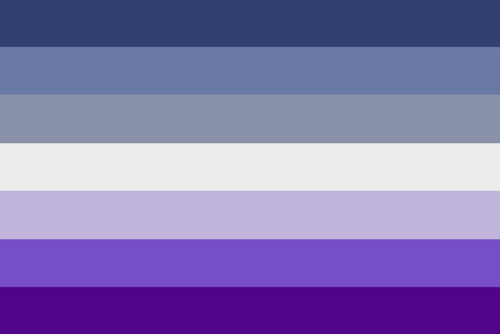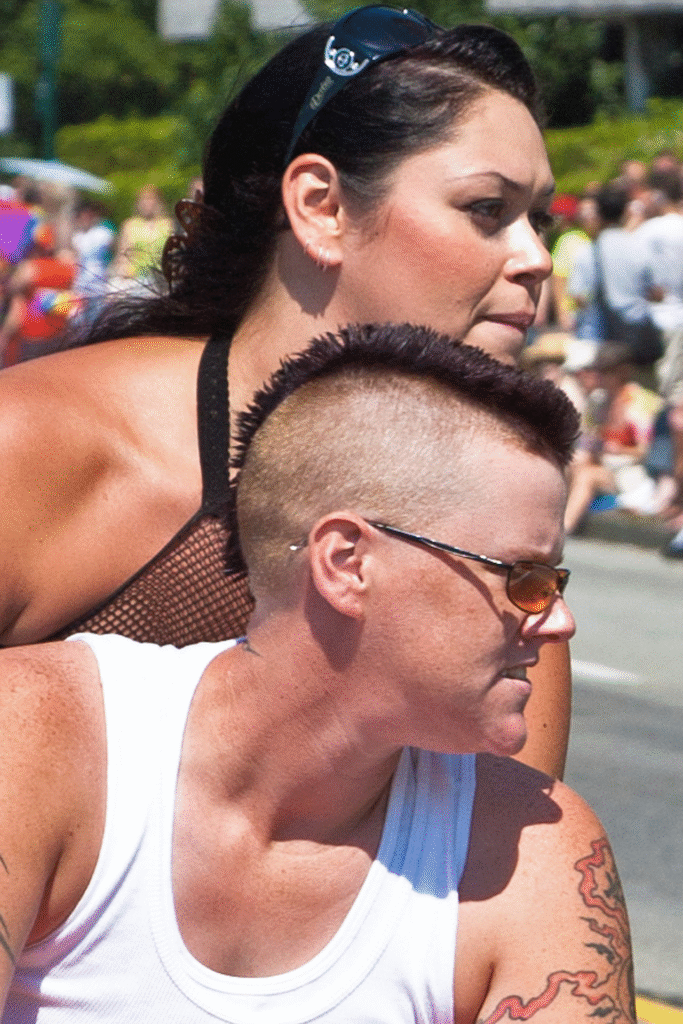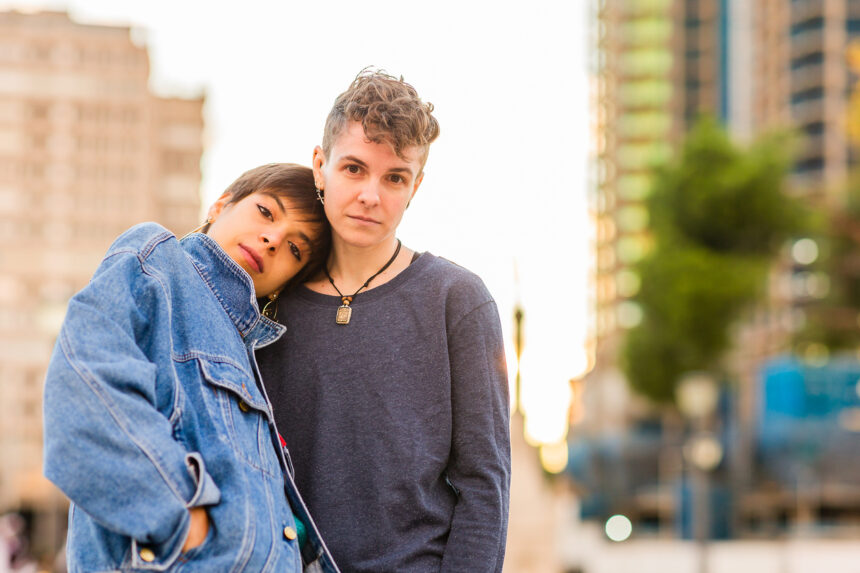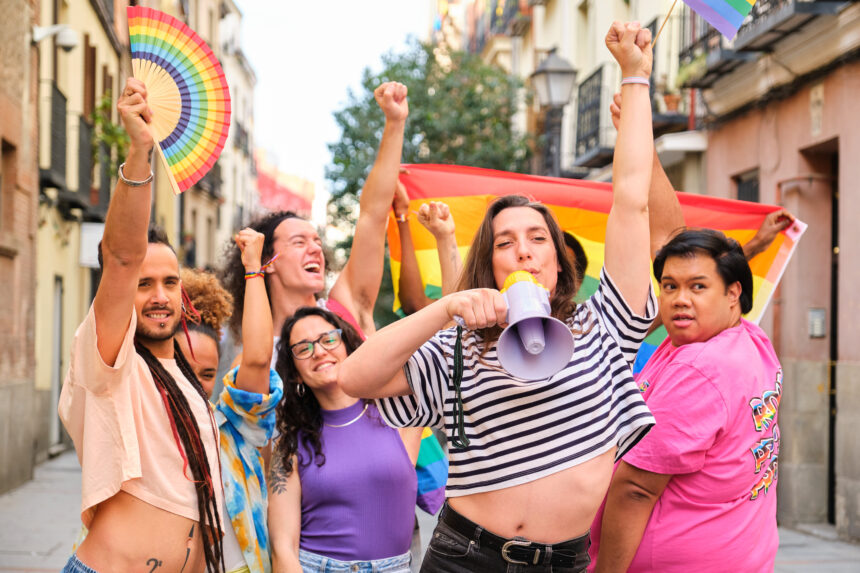What Does “Butch Lesbian” Mean?
Butch Lesbian
A “butch lesbian” is a lesbian who presents in a masculine way. While they probably don’t identify as male, they often style themselves in a masculine manner, such as short hair or wearing men’s clothing.
In addition, butch lesbians historically also play a certain social role in their community. In the 1950s, when being queer was almost always done secretly, butch lesbians played a role as protectors of local queer spots from police raids.
Butch Lesbian Flag

There are a few butch lesbian flags, but the most popular is the one above. It features seven colored stripes, in a gradient going from indigo at the top, to a white stripe in the middle, to a deep purple stripe at the bottom.
Notable Butch Lesbians
While “butch” is usually a term someone decides to call themselves, below we’ll list five notable individuals who identify (or identified) as lesbian and probably fit the definition of butch, even if they did not explicitly say so.
Lea DeLaria
When I think of a butch lesbian, I probably think of Lea DeLaria first. She’s best known for her role as “Big Boo” in Orange Is the New Black. In the show, she plays a butch lesbian, and also happens to be a butch lesbian in real life. So, she knows the role inside and out. She posts often on her Instagram, if you want to check it out.
Leslie Feinberg
Leslie Feinberg was most known for being the author of Stone Butch Blues, a book that revolutionized gender studies, adding much of the knowledge on the topic available today.
Additionally, her book is the origin of the term “stone butch”, which we’ll get more into later in the article. During her life, she identified as transgender, while still using she/her pronouns alongside other pronouns, and as a communist, being a part of many labor rights movements.
Lena Waithe
Lena Waithe is a well-known actress and screenwriter who is famous for her roles in comedies like Master of None, and for producing the drama film Queen & Slim. She’s an actress with considerable range, having played both serious and comedic roles, and she’s generally one of the most well-known butch lesbians in Hollywood.
Stormé DeLarverie
Stormé DeLarverie is a pretty important figure in butch lesbian and queer history as a whole. She’s a butch lesbian whose assault by the police was the catalyst of the Stonewall uprising. She was also a well-known drag king who crossdressed and performed at famous venues around the U.S.
Alison Bechdel
Alison Bechdel is an American cartoonist and author, best known for her comic strip Dykes to Watch Out For, and for her autobiographical graphic novel Fun Home. She’s also famous for inventing the “Bechdel Test”, which is a set of criteria that measures the gender inclusivity of a book, movie, etc. It states that for a work to pass the test, it must feature at least two female characters, who talk to each other, and their conversation must be about something other than a man.
History of Butch Lesbians
History of the Term “Butch”
The term “butch” doesn’t only have to refer to lesbians, but can also apply to anyone of any gender or sexuality who has a masculine vibe. Therefore, it makes sense that the term originally wasn’t used to describe lesbians.
According to Them.us, “butch” likely comes from the term “butcher”, which was used to refer to tough, working class kids in the early 20th century. From there, working class lesbians adopted the term a few decades later. The term eventually became commonly known in broader society, and can now refer to a masculine lesbian of any class background, or to anyone else who presents masculinely and favors the term.
Butch vs. Masc: Are They the Same?
Similarities
The main similarity between the terms “butch” and “masc” is that they both describe someone who presents in a masculine way. A “butch” or “masc” person may have similar traits such as short hair and men’s clothing, but this doesn’t mean that they’re entirely the same.
Differences
One of the differences between the two terms is that “butch” is usually used to refer to a lesbian, while “masc” is used to refer to anyone who presents masculinely, regardless of their gender or sexuality. However, butch has never been exclusively used to describe lesbians either.
Another difference is that while “masc” simply describes one’s appearance, “butch” has historically been used to describe lesbians who take on a certain social role in their community, often protecting queer social venues from police raids. While the necessity to do this is mostly gone today, many self-described butch lesbians still take up this role to honor butch lesbians of the past.
Are They the Same?
In short, no. The terms “butch” and “masc” are not fully the same thing. But, they definitely share similarities, and if you meet a butch lesbian, they’ll probably be okay with calling themselves “masc” also, but it’s still a good idea to ask.
Types of Butch Lesbians
Stone Butch
“Stone butch” is a term coined by Leslie Feinberg that means a butch lesbian who doesn’t like their “private areas” touched during sex, and gets gratification from “giving” instead of “receiving”. So, it’s more of a sex-related term than something to use to describe your identity in everyday situations. But, it’s still something that’s alright to use if you feel it aligns with your identity.

Soft Butch
“Soft butch” refers to a butch lesbian who exhibits some masculine traits but isn’t completely masculine in their appearance. So, they may wear baggy clothing and have short hair, but still wear makeup. Or they may wear men’s clothing but have long hair. It’s all up to the individual calling themselves “soft butch” and how they want to present.
Futch
“Futch” is another word for “chapstick lesbian”, or a lesbian who exhibits both masculine and feminine traits. “Futch” comes from a combination of the words “femme” and “butch”, the former meaning someone who presents in a feminine way, and the latter meaning someone who presents in a masculine way.
While you may think that “futch” and “soft butch” are the same, “soft butch” lesbians still have more masculine traits than feminine, making them still generally present as butch. While “futch” lesbians are truly a mix of masculine and feminine traits.
Dapper Butch
A “dapper butch” is a butch lesbian who dresses in an extra fashionable style, possibly wearing high quality, designer brands regularly, or taking on the aesthetic of men’s clothing from the early 20th century.
Butch Lesbian Fashion
Hairstyle
If you think of a butch lesbian’s hairstyle, you’ll probably think of a short haircut similar to a men’s style. This is often the case, but not always. Since “butch” is ultimately more about overall appearance and the way you carry yourself than about a single trait, you don’t have to have short hair to be butch. Butch lesbians often sport other masculine styles like cornrows or a “man bun”, which aren’t short-haired styles.
Outfit
Since butch lesbians aim to present masculinely, they often wear baggy clothing or just shop in the men’s section, since this is the easiest way to find masculine clothing. Of course, it depends on one’s personal style. If you consider yourself a “dapper butch”, you may be more drawn to three-piece suits than to baggy clothing, so outfits vary from person to person, but most of the time, outfits are of a masculine style.
Make-up
While butch lesbians aren’t exactly known for wearing make-up, there are exceptions to this rule. If someone considers themself “soft butch” or “futch”, they may wear light, natural makeup more frequently, or even over-the-top, drag-style makeup. There’s no hard and fast rule saying you can’t wear makeup as a butch lesbian.
Common Fashion Brands
While many butch lesbians shop in the men’s section, there are a few fashion brands catering specifically to butch lesbians, or just to masc lesbians in general. Brands such as HauteButch make masculine clothing tailored to assigned-female bodies, while underwear brand Tomboyx sells more “masculine” underwear such as boy shorts and sports bras for women and afab people.
More Lesbian Terms You Need to Know
While we’ve covered a fair amount of lesbian-related terms in our various articles, there’s always more to learn. If you want to learn more about the different lesbian identifiers out there, why not check this article out?
Conclusion
So, there you have it! This is everything you need to know about butch lesbians compiled into one article. Whether you already identify as a butch lesbian, you think you might want to call yourself one, or you just want to learn more about butch lesbians, I’m glad you gave this article a go and hope you walked away knowing more about the butch lesbian experience than you did before!






